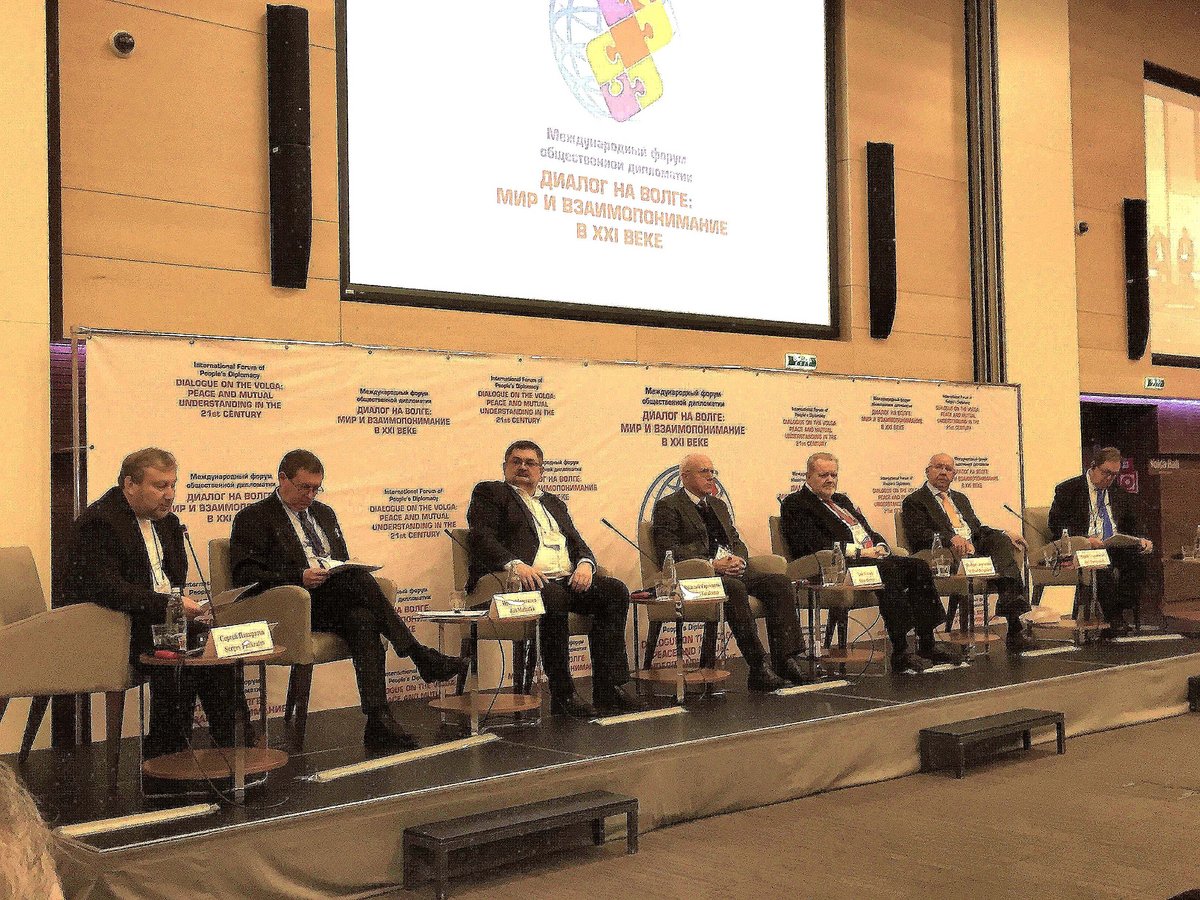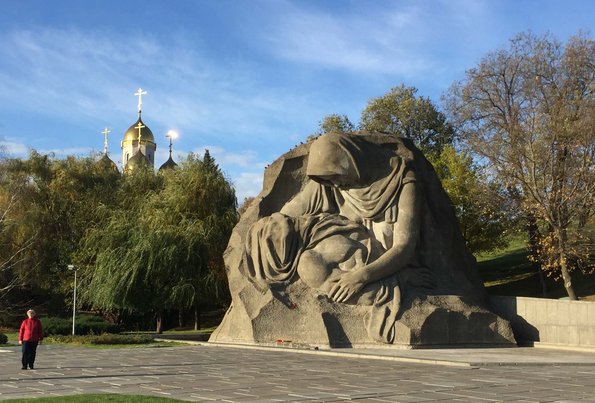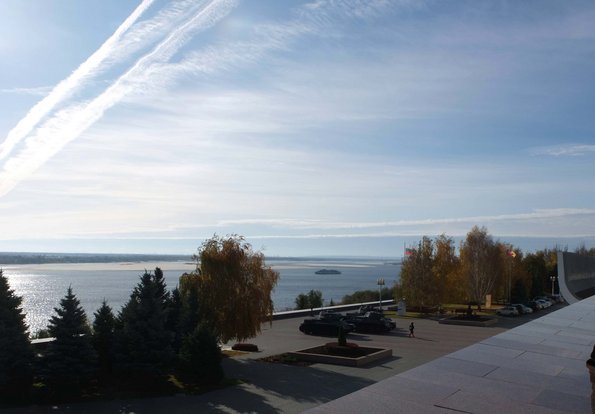“Dialogue on the Volga: Peace and Mutual Understanding in the 21st Century”
“Dialogue on the Volga: Peace and Mutual Understanding in the 21st Century”
by Eva-Maria Föllmer-Müller, Klaudia Kruck-Schaer, Marita Brune-Koch, Jürg Aeschlimann
From 31 October to 1 November 2018 the V Forum 0f People’s Diplomacy was held in Volgograd with 250 participants on the topic “Dialogue on the Volga: Peace and Understanding in the 21st Century”. More than 100 delegates from twenty countries in Europe, Asia, Africa and America came to discuss topics of global importance in these two days. The spectrum ranged from international political issues as well as urban development issues to youth policy, culture and international relations. The guiding theme of the annual forum is dialogue and mutual exchange.
Simultaneously, the 29th General Assembly of the International Association of Peace Messenger Cities (IAMPC) took place.1
Forum guests included delegates of civil society, experts, representatives of various levels of government, mayors of cities, members of city councils, employees of administrations and companies of various profiles.
The aim of this year’s Forum was to strengthen and develop cooperation in international relations. It should also contribute to a more effective solution of global and regional problems and to the promotion of the peaceful and secure development of peoples and states.
Forum participants attended the wreath-laying ceremony at the eternal flame in the Square of Fallen Fighters, honored the defenders of Stalingrad on Mamajev Hill and visited the Panorama Museum “Battle of Stalingrad”.
Some forum participants also visited the city of Volzhsky in the Volgograd oblast. The city was founded in 1951 with the construction of the largest hydroelectric power station in Europe.
The topics of the individual contributions were as varied as the countries from which the contributors had travelled. Thus, the forum was a lived dialogue and exchange during these two days. Below we can only give a small insight into the richness of the aspects and problems mentioned:
Galina Bykadorova, Chair of the Committee for Economics and Development of the Volgograd regional administration, said that Volgograd had become an important centre for networking and cooperation at a time of the deteriorating relations between the leading countries and the collapse of the entire world security system. She stressed the responsibility for the younger generation. The future of the development of the world also depends on the kind of knowledge young people acquire: “We must therefore pass on historical and cultural values to them, teach them to respect each other and work together”.
John Mutton, a councillor of the English city of Coventry, reminded that in 1944 the then Stalingrad and Coventry had established the world’s first town twinning. People’s diplomacy helped to cultivate relationships from person to person, which was very valuable. “People’s Diplomacy helped Volgograd and Coventry, especially in all the years after the Second World War, to maintain and develop relations between citizens of Russia and Great Britain.”
Roland Methling, Lord Mayor of Rostock, emphasised the importance of Volgograd for international cooperation (cf. Current Concerns No 27/28 of 11 December 2018). “I have the feeling here that one could live in a single space and progress together.” And: “Only those who know their history can successfully shape the future. But trust and truthfulnes also help to be able to make today’s decisions better and to contribute to their understanding.”
Professor Hans Köchler, President of the International Progress Organization, said that modern globalisation began in the 19th century and was accompanied by rapid technological development. Today, strong global players who take advantage of the lack of an effective system of constraints simply impose their will on the rest of the world. He contrasted this with the dialogue of cultures as the basis for stable progress and peace.
In his talk, he called upon political leaders to consider a global realignment on the basis of respect for the sovereignty and cultural identity of all nations. In this period of transition from a unipolar constellation towards a new multipolar balance of power, a sustainable policy of peace means acknowledging global interdependence and redefining the “national interest” of each and every nation in view of the global common good, i.e. on the basis of mutuality. Referring to the unilateral uses of force after the collapse of the bipolar balance of power and the large-scale destabilization, including the worldwide migration crisis, triggered by these interventions, Professor Köchler said that the United Nations Organisation can only fulfill its mandate of collective security if a multipolar balance of power emerges that – unlike the one among the Allied Powers upon the end of World War II – includes all regions of the globe.2
Yuri Starovatykh, former mayor of Volgograd, was aghast that today only the United States is portrayed as a liberator from the yoke of National Socialism. And this in view of the Russian blood toll at the Battle of Stalingrad, in which the victory over the Germans had brought about the turning point in the Second World War. The war claimed 27 million victims in the Soviet Union. He declared that attempts to diminish the role of his country in the Second World War were inadmissible. He condemned the efforts of some countries to newly write or rewrite history and called on the other participants in the Forum to work together to counter these trends. He called for more influence on the UN.
Vincent N’cho Kouaoh from Abidjan (Ivory Coast) addressed the refugee crisis. His view be different. He referred to the wars and crises in his country. They had experienced migration again and again. Young people flee the country. His country wants to develop its own solutions. To achieve this, the young people have to stay in their home countries. Visibly moved, he said: “Our youth is being taken away from us. We don’t want that. We need our youth here in our country”.
Vladimir Morozov of the Russian International Affairs Council commented on German-Russian relations. Both sides are facing a crisis of confidence – in an ice age.
While in the past Germany had played a very important role in the relations with Russia, today relations with the EU are becoming more important with new constellations. Which in his opinion means, the way to Germany is via Brussels. Much also depends on a peaceful solution of the Ukrainian conflict. The negotiations on this conflict ought to be brought on a different level; the OSCE should help in this.
Wolfgang Gehrcke, long-time member of the Bundestag for the party “Die Linke”, said with reference to Morozow that Germany bears the main responsibility for this ice age in their relations. As a member of NATO, Germany is pursuing an aggressive and non-defensive defence policy.
If one speaks of a “value-driven policy” from the German side, German-Russian relations first must include a certain humbleness, because 27 million citizens of the Soviet Union died in the Second World War. The presentation of Russia in the German media has never been as bad as it is today. Gehrke stressed that in Germany there is a huge difference between public opinion and published opinion with regard to Russia. But the majority of German citizens want good relations with Russia. Many have an unconditional desire for peace. “Never again war” is imprinted into the hearts of many.
Dr Detlef Lechler, member of the Brandenburg Berlin Entrepreneurs Union, highlighted the successful “3rd Entrepreneur Day – Russia in Mecklenburg-Vorpommern” (Russia Day) in Rostock with over 800 people. In talks with the Volgograd Chamber of Industry and Commerce, it was now agreed on to hold a major economic forum in the near future, which would give new impetus to cooperation between science and industry. Especially medium-sized projects should be given more attention. Lechler put the emphasis completely on the civic commitment. Only by this can there really be a deeper exchange and a genuine understanding between peoples.
After the conclusion of the discussions, the delegates of the IAPMC General Assembly and the International Forum People’s Diplomacy jointly adopted a resolution3 to be submitted to the United Nations General Assembly.
* * *
Russia is known for its hospitality. It is a certain attitude to life there. We too have experienced this and enjoyed it. But what we in the West talk little about: the great interest of the Russians in all historical and current questions of their country, but also in the world. With the guests of the two-day conference, but also with the other people that we got to know during our almost one-week stay, we were able to speak in such a free and open manner – even controversially – as it is hardly possible in our country without being labeled. Our translators, two young students from Volgograd, not only tried to fulfil our wishes, from a beautiful view of the Volga to the best “blinis” (Russian pancakes), to be found at a small booth in the city. They obviously enjoyed helping us in every way. But we also discussed a lot together, sometimes late into the night.
Despite the dense program – actually without any breaks – every meeting with the staff of the city of Volgograd was supported by a great willingness to help, in addition cordial, binding and humanly genuine.
In such an atmosphere, there are honest and equal encounters, and reliable relationships are formed.
The bottom line remains: Those who travel to Russia with one’s eyes open, with acuteness of mind alert and with an open heart can only be amazed and indignant at the distorted images that are being spread in the West. •
1 The International Association of Peace Messenger Cities are cities around the world that voluntarily support a United Nations-sponsored initiative to promote peace and understanding between nations. The movement began in 1986, the International Year of Peace, and lasted until 1991, when 74 cities were selected from thousands of applicants and appointed peace ambassadors by UN Secretary-General Javier Perez DeCuellar. Representatives from 63 cities met in Verdun, France, on 7 and 8 September 1988 “to build a less violent and more humane world, a world of tolerance and mutual respect, so that the concerns of peace may be better understood on the basis of justice and human rights”.
2 Cf. <link http: www.i-p-o.org ipo-nr-peace-in-an-era-of-global-instability-intpeoplesforum-volgograd-02nov2018.htm>www.i-p-o.org/IPO-nr-Peace-in-an-Era-of-Global-Instability-IntPeoplesForum-Volgograd-02Nov2018.htm
3 see <link http: www.iapmc.org content articles artmid articleid>www.iapmc.org/Content/Articles/ArtMID/1387/ArticleID/3788
Citizens’ initiatives must not be an instrument of ideology – on the term “People’s diplomacy”
ef. People’s diplomacy is diplomacy “from the bottom up”, on the level of citizens, from person to person. The term became known at the beginning of the Cold War, when diplomatic relations between the former USSR and the West reached a dead end. To ease the situation, the Soviet government organised the 1957 World Festival of Youth and Students in Moscow under the motto “For Peace and Friendship”. The term people’s diplomacy is not uncontroversial, because for many it sounds like propaganda and manipulation. In February 2018 the first conference on people’s diplomacy was held in Moscow in the Civic Chamber of the Russian Federation. Konstantin Kosachev, Chairman of the Committee of the Federation Council on International Affairs, emphasised the importance of people’s diplomacy: “In difficult times, diplomacy from the bottom up can become a means of saving relations between countries. The fundamental precondition for people’s diplomacy, however, is its independence from government policy. “The state must provide financial support for civil society and its initiatives. But under no circumstances should it interfere in their activities - this would put an end to people’s diplomacy”. Oksana Kogan-Pech, representative of the organisation “Russkij Mir”, said: “For the future it is enormously important to build more and more bridges of friendship between the countries”. And this is best done with people’s diplomacy.
Source: Moskauer Deutsche Zeitung (Moscow German newspaper) from
5 November 2018
Volgograd is the capital of people’s diplomacy
Since this year Volgograd has officially been the capital of people’s diplomacy and as such has been “patented” by President Vladimir Putin and the Russian Foreign Ministry. This is reflected in a series of official meetings and encounters that took place in Volgograd (e.g. World Cup 2018, October 2018: international conference on land reclamation [Land cultivation of previously unused agricultural land] with representatives from 42 regions of Russia, Kazakhstan, Belarus and Ukraine, meetings of the two foreign ministers of Germany and Russia).
The city of Volgograd was not chosen at random: The high authority of Stalingrad - abroad the city is mainly known by this name - offers the possibility to bring topics of global importance to the world level.
Volgograd is a member of international and regional organisations and associations, among others: United Cities and Local Governments, UCLG, the International Federation of Capitals and Cities, with the aim of developing cooperation between cities and regions in order to raise the standards of living of the population. Furthermore, the International Association of “Twin Cities”, which coordinates the links between twin cities and partner regions, the international organisation Mayors for Peace, which endeavours to contribute to peacekeeping by banning nuclear weapons, and the International Association of Peace Messenger Cities.
Source: Sergey Lapshinov, Head of the Administration of International and Regional Relations of the City of Volgograd
Topics of the Conference in Volgograd
- Discussion No 1
“Global Politics in the Age of Instability” - Discussion No 2
“Cities as Peace Messengers: Municipal Peacemaking Practices in the 21st Century” - Round Table 1
“Improving a City – Enhancing the Quality of Life: Cities’ Development as a Peacemaking Process” - Round Table 2
“Mechanisms of the International Municipal Partnership” - Round Table 3
“Russia and Germany: Relationship Perspectives in the Changing World” - Round Table 4
“Culture and International Relations of the 21st Century: Civilized Choice, Challenges and Perspectives” - Round Table 5
“Youth Policy and People’s Diplomacy: Overcoming Social Stereotypes, Building an Environment for Tolerance” - Concluding Session
Reports on the work of the round tables, and the conference, adoption of the concluding document to the UN
Main speakers i.a.: Prof. Dr. Wilfried Bergmann, Deputy Chairman of the German-Russian Forum (Germany), Yury Starovatykh, Chair of the Volgograd regional branch of the Russian Civil Foundation “Russian Peace Foundation”, honorary citizen of the hero-city of Volgograd, honorary citizen of Hiroshima (Russia), Prof. Dr. Dr. h.c. Hans Köchler, Chairman of the Department of Philosophy at the University of Innsbruck (1990–2008), Founder and President (since 1972) of the International Progress Organization (I.P.O.) (Austria), Andrey Kosolapov, Chair of Volgograd City Council (Russia), Bill Boerum, Honorary Chairman of the Board of Directors of Sister Cities International association in the United States. (USA), Prof. Dr. Vasily Tarakanov, Rector of Volgograd State University, (Russia), Roland Methling, Lord Mayor of the Citiy of Rostock (Germany), Vincent N’cho Kouaoh, Vice-Governor of Abidjan Autonomous District, President of the International Association of Peace Messenger Cities (Ivory Coast) and Dušan Stojanovic, Executive Secretary General of the International Association of Peace Messenger Cities (Slovenia).


